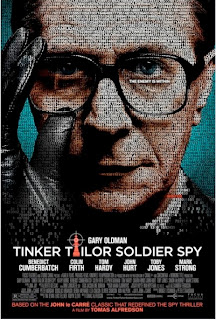Weekly Review -- Game on
 Tinker Tailor Soldier Spy (2011) -- When it comes to cinema spies, less is always more. It is all about a subtle glance, a secret smile, an unseen wink. John le Carré was aware of this need for mystery, creating a living puzzle out of his hero -- or anti-hero? -- George Smiley and drawing from his own civil service career in his writing. Tomas Alfredson's adaptation of Tinker Tailor Soldier Spy is one of the finest espionage thrillers in recent years, offering plenty of riddles for the audience to solve and leaving plenty of room for discussion.
Tinker Tailor Soldier Spy (2011) -- When it comes to cinema spies, less is always more. It is all about a subtle glance, a secret smile, an unseen wink. John le Carré was aware of this need for mystery, creating a living puzzle out of his hero -- or anti-hero? -- George Smiley and drawing from his own civil service career in his writing. Tomas Alfredson's adaptation of Tinker Tailor Soldier Spy is one of the finest espionage thrillers in recent years, offering plenty of riddles for the audience to solve and leaving plenty of room for discussion. At the height of the Cold War, an MI-6 operation goes wrong, causing the dismissal of agency director Control (John Hurt) and his deputy George Smiley (Gary Oldman). Soon afterward, rogue agent Ricki Tarr (Tom Hardy) re-appears, claiming that a mole has assumed the role of an MI-6 senior officer. The allegations bring Smiley back to the job and the experienced spy starts his investigation with the help of eager Tarr and his boss, the intelligent and loyal Peter Guillam (Benedict Cumberbatch). However, in a world of strategic lies and duplicitous allies, who can Smiley trust?
What impressed me the most about Alfredson's film is the retro ambiance. The narrative feels as though it had arrived from a different era; its smoky, leaden visuals and themes successfully convey the dark paranoia of the period. There is no Bourne or Bond-type action here. There are no exotic locales, dramatic explosions, innovative car chases or glamorous villains that plan on taking over the universe. Instead, we have a shadowy world full of contrasts and deceits, where allies and enemies can turn at the drop of a hat and where information value cuts into every notion of empathy. The film is an eloquent study in stripped restraint, placing an emphasis on dialogue and plot twists rather than attempting to saddle the already loaded story with glossy elements. Alfredson wisely recognizes that additions would be redundant and that all he needs to do, in order to present this complex cinematic game, is rely on the all-encompassing enigma of the human factor. The saying about silent waters running deep comes to mind.
An intriguing aspect of the screenplay are the numerous allusions to the concept of watching. There are eyes everywhere in this milieu. From Smiley's large glasses to his very vocation, from colleagues observing other colleagues to Smiley occasionally asking Guillam to be his eyes, all of these instances point to an insular, Orwellian realm. The characters' reality is paradoxically both inside and outside our own, as illustrated by the Christmas party sequences. As much as the event looks like any company's party, as much as these people laugh and drink and celebrate and as much as they resemble the rest of us, the very next sequence can easily prove that they are not. As close in proximity as our residences and workplaces may be to theirs, our brand of pure and uncompromised life could never belong in the same context as their well of secrets and victims. The field of espionage is inhabited by personalities that have learned to negotiate their existence and watch from a distance, invisible by choice and hidden by necessity.
The acting is what the film hinges on and it enthralls from beginning to end. Oldman is a quiet storm as Smiley, a man who uses his resourcefulness sparingly, but with deadly results. The first twenty minutes or so are one of the most interesting parts, in the sense that the actor makes us realize what his character is doing without actually telling us anything. In these scenes, Oldman has no lines at all, yet we can tell that Smiley is used to absorbing every single detail around him. In retrospect, we can also tell that this unassuming man does not fail to notice any detail of importance. Vigilance and alertness have seeped into his DNA over the years and Oldman brings this intuition to the big screen as only Oldman can. Hardy provokes sympathy as the gravely conflicted Tarr, while Cumberbatch creates a rich portrayal of a spy not entirely comfortable with the operation and Colin Firth gives a strong performance as an uptight bureaucrat. I also loved Kathy Burke, who brings the right dose of bitter humor to the role of Connie Sachs, Smiley's former colleague.
In its ingenuity, Tinker Tailor Soldier Spy is a throwback to the 1960s and 1970s genre films. It is the kind of film that does not appear to be in vogue often nowadays, due to the influx of entertainment catering to our hunger for instant gratification. It examines the idiosyncrasies of behavior within the sphere of covert affairs, not forgetting for one moment that the chess pieces are what makes the game worth watching.
9/10


0 Comments:
Post a Comment
<< Home